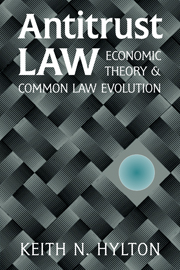Book contents
- Frontmatter
- Contents
- Preface
- 1 Economics
- 2 Law and Policy
- 3 Enforcement
- 4 Cartels
- 5 Development of Section 1 Doctrine
- 6 Rule of Reason and Per-Se Rule
- 7 Agreement
- 8 Facilitating Mechanisms
- 9 Boycotts
- 10 Monopolization
- 11 Power
- 12 Attempts
- 13 Vertical Restraints
- 14 Tying and Exclusive Dealing
- 15 Horizontal Mergers
- 16 Mergers, Vertical and Conglomerate
- 17 Antitrust and the State
- Index
7 - Agreement
Published online by Cambridge University Press: 12 November 2009
- Frontmatter
- Contents
- Preface
- 1 Economics
- 2 Law and Policy
- 3 Enforcement
- 4 Cartels
- 5 Development of Section 1 Doctrine
- 6 Rule of Reason and Per-Se Rule
- 7 Agreement
- 8 Facilitating Mechanisms
- 9 Boycotts
- 10 Monopolization
- 11 Power
- 12 Attempts
- 13 Vertical Restraints
- 14 Tying and Exclusive Dealing
- 15 Horizontal Mergers
- 16 Mergers, Vertical and Conglomerate
- 17 Antitrust and the State
- Index
Summary
The cases in this chapter indicate the circumstances under which a court will infer an agreement. Because of the procedural posture of the cases, the legal holdings do not offer much insight, for in the typical case the Supreme Court upholds a lower court decision that in turn relies on facts and inferences that are difficult to assess on the basis of a cold record. Not coincidentally, dicta, specifically general comments about the evidentiary requirements of Section 1, make up the important parts of these opinions.
The decisions seem to reveal a trend: From roughly 1940 to the early 1950s, the opinions suggest that not much more than purely circumstantial evidence would suffice to prove conspiracy in violation of Section 1. This coincided with a period some antitrust commentators referred to as the New Sherman Act. With the New Sherman Act, according to the commentators, courts would set aside burdensome proof requirements under Section 1 and replace them with a doctrine that brought antitrust law into agreement with modern industrial organization research. That research indicated that cartel pricing could occur in the absence of explicit agreement.
Starting in 1954, the year of the Court's decision in Theatre Enterprises v. Paramount Film Distributing Corp., courts began issuing decisions that disappointed New Sherman Act proponents. The post-Theatre Enterprises opinions showed little tolerance for plaintiffs who brought claims of conspiracy supported by purely circumstantial evidence.
- Type
- Chapter
- Information
- Antitrust LawEconomic Theory and Common Law Evolution, pp. 132 - 143Publisher: Cambridge University PressPrint publication year: 2003



